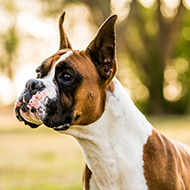Majority of ear-cropped dogs in UK originate from abroad, study finds

The new SAVSNET study provides important insights into the demographics of ear-cropped dogs.
Dogs affected by ear cropping in the UK are mostly aged one or younger and originate from countries where the procedure is also illegal, according to new research.
Using electronic health data from the University of Liverpool’s Small Animal Veterinary Surveillance Network (SAVSNET), researchers identified 132 dogs with cropped ears between 2015 and 2022, with rates peaking in 2021.
Of these, there was evidence that 84 per cent were imported from Romania, Hungary, Bulgaria, Serbia, Spain, Poland and Ireland. Only a handful of ear-cropped dogs in the study appeared to have endured the procedure in the UK, where it was made illegal in 2006.
American bulldogs, Dobermanns, Italian mastiffs, bulldogs and mastiffs were all found to be significantly overrepresented, while affected dogs are also more likely to be unneutered.
It is hoped the findings, published in Veterinary Record, will help to inform strategies to tackle the alarming trend, fuelled by a rise in social media, celebrity influence and a lack of import regulations.
Fifth-year University of Liverpool student Lucy Norris, who conducted the research, said: “I was acutely aware of campaigns by the RSPCA and others raising awareness of the rise in reported cases of ear cropping. This new SAVSNET study provides important new insights into the demographics of affected dogs that could help inform both policy and targeted education to tackle this growing problem.”
Dogs Trust veterinary director Paula Boyden believes the study will be helpful in determining how best to educate the public about the impact and cruelty of this behaviour.
She said: “Despite ear cropping being illegal in both the UK and the EU, we are seeing increasing numbers of dogs who have been subjected to the unnecessary procedure both in the media and through our rehoming centres.
“There is no medical reason to crop a dog’s ears. The process can be extremely painful, result in complications and can cause long-term issues such as inhibiting a dog’s ability to communicate. Education is key to stopping this abhorrent practice.”



 A free webinar exploring the development of the Kennel Club's registration system and the evolution of closed breed registers has been announced.
A free webinar exploring the development of the Kennel Club's registration system and the evolution of closed breed registers has been announced.